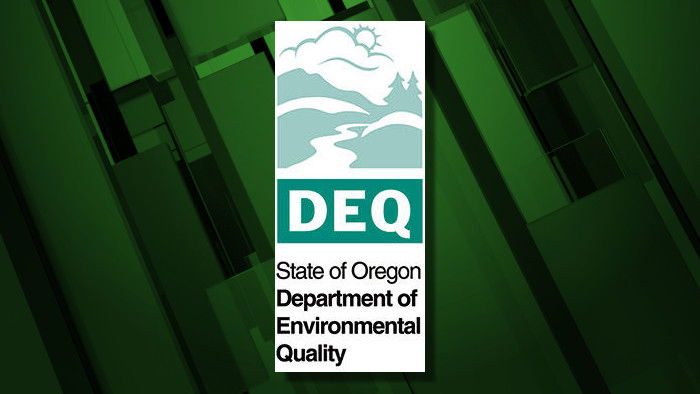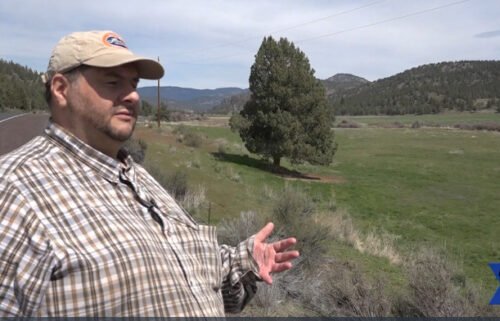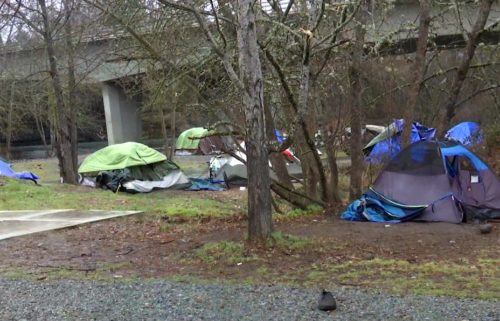Oregon OKs ‘more aggressive’ climate protection program

Manufacturers 'disappointed'; Oregon Farm Bureau plans court challenge
PORTLAND, Ore. (AP) — The Oregon Environmental Quality Commission on Thursday approved a new Climate Protection Plan for the state that targets a 90% reduction in greenhouse gas emissions from transportation fuels and natural gas by 2050.
Oregon Public Broadcasting reports the commission’s 3-1 vote comes after years of unsuccessful attempts by state lawmakers to start an economy-wide cap-and-trade program to reduce the carbon emissions that contribute to climate change.
Last year, Gov. Kate Brown ordered the Oregon Department of Environmental Quality to develop a new set of administrative rules that would cap greenhouse gas emissions from fossil fuels and reduce them over time.
The resulting Climate Protection Program caps emissions from gasoline, diesel, propane, kerosene and natural gas and makes the cap progressively more restrictive.
Set to launch in 2022, the program will distribute a declining number of emission credits to fuel suppliers and allow them to buy and sell those credits as the cap comes down. It also creates a Community Climate Investment Fund that will permit companies to pay for emission reductions in communities most impacted by climate change.
The program will initially regulate 16 fuel suppliers and three natural gas utilities. Thirteen industrial facilities also will be regulated under a different system that creates individualized plans to reduce emissions using the best available technology. Companies that can’t meet the emission reduction targets could face financial penalties.
Companies have protested the higher targets, arguing higher prices for gasoline, diesel and natural gas will result and have ripple effects throughout the economy.
Industry groups did their own analysis of the program and found it would be more costly for consumers than what the DEQ is projecting, based on its economic analysis.
If prices in Oregon increase by more than 20% of the fuel prices in other states, Oregon DEQ staff will do a review to determine whether the program needs to be changed, Nicole Singh, DEQ climate policy advisor, said.
Environmental Quality Commission votes to establish Climate Protection Program
December 16, 2021
New DEQ program will reduce greenhouse gas emissions in Oregon by 90% by 2050
Today the Oregon Environmental Quality Commission voted 3-1 to establish the Climate Protection Program which sets enforceable and declining limits on greenhouse gas emissions from fossil fuels used throughout Oregon. The limits apply to diesel, gasoline, natural gas and propane, used in transportation, residential, commercial and industrial settings.
Along with other actions by the Oregon Legislature, this makes Oregon one of the few states in the nation with a comprehensive and clear pathway to reducing the emissions that cause global warming. As approved, the new rules put Oregon on track to reduce emissions from fossil fuels by 50% by 2035 and 90% by 2050, reductions that scientists agree are required to avoid the worst effects of climate change.
“Every year since I became Governor, Oregon’s extreme weather has been worse than the last. From extreme heat and chronic drought to rising sea levels to wildfires more intense than any in recent memory, we are seeing the devastating impacts of climate change right in front of us,” said Gov. Kate Brown. “We know those impacts are felt disproportionately by our rural, low-income and communities of color. I’m proud that today, Oregon is taking the historic step to put tools in place to dramatically reduce greenhouse gas emissions. Combined with our targets for transitioning to 100% clean energy sources, as well as the steps we have taken to expand access to electric vehicles, Oregon is centering the needs of vulnerable communities and leading the way in the fight against climate change.”
The Oregon legislature approved funding for DEQ to develop this program in 2020. DEQ convened public listening sessions and technical workshops to hear from Oregonians across the state to understand areas of public interest and concern and identify key options for designing a fair and effective program. A 34-member advisory committee appointed by the EQC met with DEQ seven times to help the agency craft draft regulations. DEQ held multiple public hearings on the proposed rules and received more than 7,000 written public comments.
“We must act decisively and urgently to keep what makes Oregon so special – the fisheries, the farms, the snowy mountains, the forests and vineyards,” said EQC Chair Kathleen George. “So, guided by the best science, DEQ’s Climate Protection Program is a critical step forward to achieve deep, long-term reductions in Oregon greenhouse gas emissions, and to help strengthen climate resilience across the state. This is a historic opportunity to be leaders in creating a resilient economy that is decreasingly reliant on fossil fuels.”
Today’s action makes Oregon the second state in the nation to set enforceable limits on greenhouse gas emissions from fossil fuels, including gasoline, diesel and natural gas; California was the first state to take such action. DEQ Director Richard Whitman noted that the new Climate Protection Program will work in tandem with other state efforts, including DEQ’s Clean Fuels Program, Clean Cars Standards and the new Advanced Clean Truck Rules and Landfill Methane Rules adopted in November. DEQ also provides incentives for clean vehicles. Other key parts of Oregon’s climate work are being led by the Oregon Public Utilities Commission and the Oregon Department of Energy (100% Clean Energy), the Oregon Department of Transportation (EV charging infrastructure) and the Oregon Department of Land Conservation and Development (programs to reduce reliance on automobiles).
“The Climate Protection Program adds to a growing list of innovative programs Oregon has established to ratchet down our burning of fossil fuels for energy,” Whitman said. “We now have a comprehensive pathway to a cleaner energy future in Oregon, one that will bring new jobs, cleaner air and, most importantly, a strategy that shows yet another way for states to lead on climate.”
How the program will work
Starting in 2022, the CPP will issue permits – known as “compliance instruments” – to companies that supply fossil fuels for use in Oregon. The permits, each equal to 1 metric ton of emissions, will be issued each year in amounts equal to that year’s annual emission limit. Each year, the allowable emission limit will be reduced by lowering the number of compliance instruments issued to those companies. Failure to reduce emissions from fuels will result in enforcement action by the state.
Suppliers of fossil fuels can comply with the declining emissions limits in a variety of ways. Many of these companies are already incorporating renewable fuels, such as ethanol and renewable diesel, into their fuels mix, displacing fossil fuels and lowering carbon emissions. Companies also can trade with one another if some reduce faster than others.
Fuel suppliers also can elect to meet part of the program requirements by paying into a new Community Climate Investment fund. This fund will invest in projects that help communities transition from fossil fuels more rapidly – reducing emissions, improving health and creating new jobs. The CCI fund will invest in communities historically disadvantaged by air pollution and particularly vulnerable to the impacts of climate change, including communities of color and tribes, as well as rural communities.
The rules also include more specific requirements to curtail emissions at about a dozen large manufacturing facilities. These regulations require facility-specific evaluations to identify technologies and practices that will reduce those emissions.
To learn more about the Climate Protection Program, visit the rulemaking webpage . The public may sign up to receive updates here.
About the Oregon Department of Environmental Quality
The Oregon Department of Environmental Quality protects human health and the environment by controlling air and water pollution, reducing the impacts of manufactured products and cleaning up contaminated properties. DEQ engages the public in decision-making and helps communities solve problems in ways that are economically and environmentally sustainable.
Manufacturers respond to adoption of cap-and-reduce regulatory program
Urge changes to new program to protect Oregon industries from unaffordable cost increases
Salem, Ore. - Following the Oregon Environmental Quality Commission’s (EQC) vote today to adopt rules establishing a new statewide carbon regulatory program, Oregon Manufacturers and Commerce (OMC) urged the Department of Environmental Quality (DEQ) and state lawmakers to recognize the urgent need for modifications to the program as it takes effect. During the rulemaking process that developed the program, OMC urged regulators to recognize that the proposal would lead to unaffordable cost increases for businesses and consumers alike, would lead to disinvestment by employers, and included unattainable environmental mandates. Unfortunately, nearly every industry suggestion for improving the program was rejected.
“We are disappointed in the EQC’s decision to adopt this program today,” said Shaun Jillions, Executive Director of Oregon Manufacturers and Commerce. “Throughout the rulemaking process, we joined dozens of Oregon industries in highlighting the significant negative impacts this program would have on both employers and consumers. These impacts were further highlighted by an economic study that extensively analyzed the program and its price tag. Unfortunately, state regulators declined to acknowledge these concerns and relied on a far less thorough study and comments from supporters of the program. The end result is a program that will need major adjustments in the immediate future to prevent dramatic price increases and job losses.”
According to a macroeconomic impact analysis conducted by Energy Strategies, LLC and RECON Insights, LLC, the cap-and-reduce program could add up to $0.36 per gallon to the cost of gasoline by 2050. The study further found that natural gas rates could increase by as much as 42% by 2035, with additional rate increases expected through 2050. Taken together with additional impacts from the program, the study forecasted 125,570 fewer Oregon jobs would be available by 2050 under the program. Economists expected fewer jobs particularly among manufacturers and found that rural communities would be disproportionately impacted relative to other regions of the state.
“We urge the DEQ and the legislature to carefully monitor the implementation of this program for its expected impacts on essential industries and Oregon jobs,” continued Jillions. “We remain hopeful that policymakers will be open to instituting alternative compliance pathways and additional modifications in the future.”
Oregon Farm Bureau Responds to “Climate Protection Program”
The Oregon Farm Bureau is disappointed in the decision of the Environmental Quality Commission to circumvent the Legislature to adopt a “cap and trade” program by rule. The so-called “Climate Protection Program” will devastate Oregon’s farmers and ranchers, raising the costs for the fuels, propane, and natural gas our rural communities rely on to produce food and fiber as part of a global food system.
While the rules will have an imperceptible impact on global climate change, the impact on Oregon’s rural communities will be real and hard felt. Oregon’s farmers and ranchers compete in a global marketplace, and a decrease in farm viability will only increase global emissions, as Oregon transitions our agricultural production to other states and countries.
Not only do these rules exceed the agency’s authority, they were developed through a rules advisory committee that was hand-selected by the Department of Environmental Quality to allow advocate’s voices to dominate the conversation, and with time-limited hearings designed to avoid real discussion of the impacts of the rules. Instead, the department modeled scenarios that discounted the real impacts the new program will have on consumers.
The Oregon Farm Bureau will be pursuing a legal challenge to the rules and hopes that voters do not forget this abuse of power when they see their home heating costs and fuel pump prices continue to skyrocket while their income stagnates.
Governor’s Environmental Quality Commission places partisan and unrealistic emission mandates on Oregonians
SALEM, Ore. – Oregon House Republican Leader Vikki Breese-Iverson (R-Prineville) released the following statement in response to new regulations passed by the Oregon Environmental Quality Commission that passes an aggressive version of cap-and-trade from the Governor’s office. Critical public comments point to the lack of cost controls that will drastically raise prices for Oregonians.
“This executive action is another example of how out of touch Governor Brown is with Oregonians,” said Leader Breese-Iverson. “People want more inclusive and collaborative responses to issues. Instead, the Governor is forcing people to pay higher prices to compensate for global emissions originating outside of our state. This approach is no different than a partisan proposal we saw in the Legislature, ignoring serious concerns to push an expensive and political climate plan on the state. Oregonians would be better served with a balanced approach benefiting everyone.”
A report from the Department of Environmental Quality acknowledged that this plan could increase fuel prices and the cost of goods while pushing businesses out of state.



